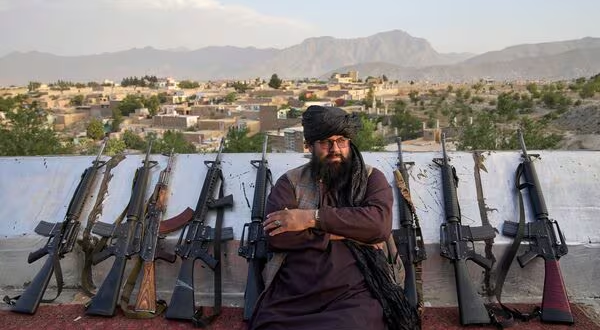KABUL – Afghanistan, long viewed as a war-torn and unstable country under Taliban control, is now making headlines for a surreal and controversial attempt to attract American tourists — with a promotional video that blends dark humor, irony, and armed adventure.
The video, produced by Raza Afghanistan, a tour agency run by 28-year-old Yosaf Aryubi, opens with imagery disturbingly similar to Taliban hostage videos: three hooded figures kneel in a desert setting, while a fighter announces, “We have one message for America.” Just as tension peaks, one hood is lifted to reveal a grinning man who enthusiastically says, “Welcome to Afghanistan!”
What follows is an intentionally jarring montage. Armed locals flash peace signs, pose for yoga, and grin next to tanks. A man floats in pristine turquoise waters holding a gun, while another does chin-ups from a tank barrel. One “tourist” inspects an M4 rifle stamped “Property of US Government” and jokes, “It’s not even on safety!” A diner eats lunch with a parrot on his head, and a flower is placed into a gun’s muzzle — a chaotic fusion of peace imagery and militarism.
The video, 50 seconds long, has rapidly gone viral since its appearance on Taliban-linked social media accounts earlier this week. Its caption, featuring a bald eagle and U.S. flag emoji, reads: “The mountains of Afghanistan are prepared and poised to welcome the most of.” The clip has generated reactions ranging from laughter and confusion to outrage and disbelief.
Speaking to The Independent, Aryubi — who splits his time between Kabul and California — said the video was designed to mock how the West sees Afghanistan while offering a glimpse into what his guests actually experience. “We offer a mix of cultural, historic, and adventure packages,” he explained. “It’s not all war and Taliban fighters. There’s beauty, history, and people living ordinary lives here.”
Aryubi’s agency, Raza Afghanistan, organizes trips for international travelers, despite the U.S. State Department’s stern Level 4 travel advisory warning Americans against visiting the country “for any reason.” He insists that his tours are safe, albeit unconventional. Visitors reportedly explore historic sites, ancient forts, and villages built into cliffs, sometimes under armed escort.
Social media influencers, particularly from the U.S. and Europe, have already begun documenting trips to Afghanistan, sharing photos of themselves trekking through mountains or sipping tea in local bazaars. While some followers praise their bravery, others accuse them of glamorizing a regime that enforces draconian laws and limits basic freedoms, especially for women.
Tourism numbers in Afghanistan remain low but are growing. From just 691 foreign visitors in 2021, the number reportedly rose to around 7,000 by 2023 — many lured by adventure, curiosity, or the opportunity to visit a country few dare to explore.
Currently, Russia is the only country openly promoting organized travel to Taliban-controlled Afghanistan. Following Moscow’s recent decision to formally recognize the Taliban government — the first nation to do so — several Russian tour companies began advertising week-long trips for about 235,000 rubles (roughly $3,000). Departures are reportedly scheduled for mid-July. However, the Alliance of Russian Travel Agencies has distanced itself from the trend, warning that organized group tours remain unfeasible due to persistent security risks.
Other niche adventure travel agencies, such as Untamed Borders, have also offered Afghanistan tours for years, operating largely from neighboring Pakistan and arranging for visa support and local guides. But none have matched the viral visibility or audacity of Raza Afghanistan’s promotional tactics.
Still, despite Aryubi’s assurances and the growing curiosity among Western tourists, international governments continue to caution against travel to Afghanistan. The U.S. State Department’s latest advisory notes the “risk of kidnapping, terrorism, wrongful detention, and violent crime” as persistent and severe.
Whether the bizarre video ultimately draws more American tourists or simply fuels debate over ethics, security, and tourism under Taliban rule remains to be seen. But one thing is clear: Afghanistan’s rebranding effort has captured the world’s attention — for better or worse.
 Afghanistan Times
Afghanistan Times




